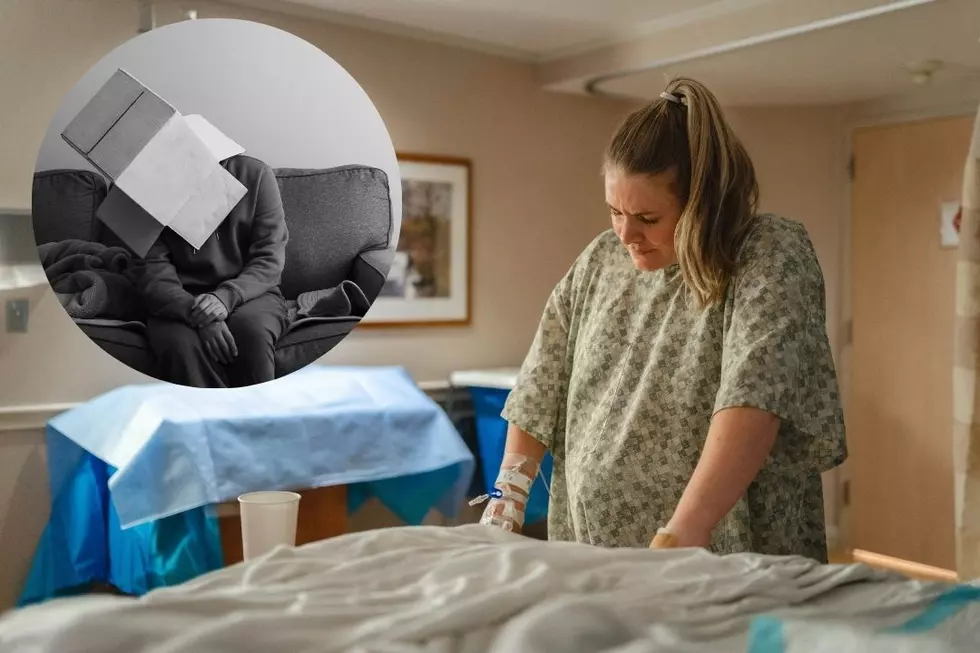
‘Lady Dynamite': A Funny, Devastating and Disorienting Fever Dream
Pretend, for a second, that someone's just blindfolded you. Next, you get a quick kick in the back, and after an unsettling splash you find you've quickly sunk — hands tied behind your back — to the bottom of a pool. Improbably, you manage to orient yourself and regain sight, but just as your reflexive kicks finally lift you to the surface, an earthquake manifests and tilts the structure sideways, thrusting you back underwater. Left? Right? Up? Down? Depth perception is fleeting, and there's no saying for sure which is which.
Though your mortality is apparent, your panic subsides. Why? Among the chaos, you suddenly notice an inflatable kangaroo pool toy that's safely settled on an adjacent clearing, and laughing at its plastic pouch is less of a strain than considering what comes next.
Treat this as your field guide to watching Lady Dynamite, comedian Maria Bamford's Netflix comedy series that premieres on May 20. Within the pilot episode's first three minutes, Bamford, who plays Maria Bamford shooting a fictional account of the life of Maria Bamford, unveils a twisted equation that bends time, space and reality to tell the story of a mentally ill joke-teller. It's Louie meets Inception raised to dizzying exponents that will have you re-examining the laws of physics.
The show opens with Maria meeting longtime manager Bruce Ben-Bacharach (Fred Melamed) after her most recent stay in a psychiatric rehab facility. She explains to Bruce that she's finally reached peace and clarity in her life, and will henceforth aim to simplify things — no more high-paying gigs that pay bucketloads, no more burning the candle at both ends for exposure. Being a yes-woman was the catalyst to her most recent breakdown, Maria's realized, and taking a stake in smaller community projects will help her heal.
But Lady Dynamite doesn't give the audience the luxury of a subsequent linear narrative: Cleaved between present-day missions to institute a new neighborhood bench or catch up with old friends, Maria tosses back to her past self to reexamine her most pronounced bouts of mania. Sometimes, the moments are explicitly identified ("past" and "Duluth" occasionally pop up on-screen; the latter identifies days spent in a treatment center). Other times, stories unveil themselves through stream of consciousness. If that's not enough to give you vertigo, Maria (and Maria's Maria) occasionally break the fourth wall (other times, they think they're breaking the fourth wall, but they're not talking to anyone in particular) to spontaneously wax poetic.
Though Maria's suffering is always clear, the spirited Bamford makes it hard not to laugh along with the character. Her affecting of a wealthy tennis pro's identity in one episode — complete with a conversational Liza-gurgle — has roots in Maria's obsessive need to please, but she finds humor in her own condition and with her implicit permission, so do we. She splits a spaghetti dish with a bicycle in a fantasy montage, and we giggle. She films a humiliating commercial spot for new, zany Japanese product Pussy Noodle, and we crack a smile.
Then, elsewhere, Maria's suffering comes without built-in instruction for reaction. In one particularly painful flashback, she relays — after her very first psychiatric treatment — that she's recovered, and her thrill is relentless. She's on such an upswing that she even convinces her family to start a band in celebration. But Maria relapses halfway through the group's first gig, finding herself slowly swallowed by the lightning-quick return of her depression.
"I'm not cured, I think I need more help, mom," she says in a devastating moment. Is it a supplement to a bigger joke, and do we maintain our good humor? Is it a separate experience, and to we turn on a dime to cry? Happy and sad perform swirling tangos through scenes, and whether their merging is a device to add context or raw, fresh evidence of Bamford's own public experience with bipolar disorder, it's sometimes painfully affecting.
Here's the good news: Maria's never going through the worst of things alone. Lennon Parham and Bridget Everett, who play Maria's best friends Larissa and Dagmar, respectively, are funny in a way that doesn't require exploration. Ana Gasteyer is brilliant as Karen Grisham, Maria's agent, who would instinctively swipe the shirt off your back.
And then there's Mira Sorvino, who unexpectedly puts Lady Dynamite's competing vortexes into perspective. After filming a pilot together, Maria asks the actress — who's also playing herself (who's also playing others...) — how she keeps everything straight. Sorvino's Mira says:
"Okay, so there was Millicent Pratt, the British actress playing the American actress Jennifer Nichols who's playing a version of herself playing Mrs. White on the sitcom White Trash."
Then, naturally, Mira climbs into her PT Cruiser, shifts up and flies away, leaving a trail of fluorescent light behind her airborne hatchback. And why not? It's probably the quickest way home.
Season 1 of Lady Dynamite is available May 20 on Netflix.
These 5 New Summer Shows Will Get You Through Summer Rerun Season:
More From PopCrush









